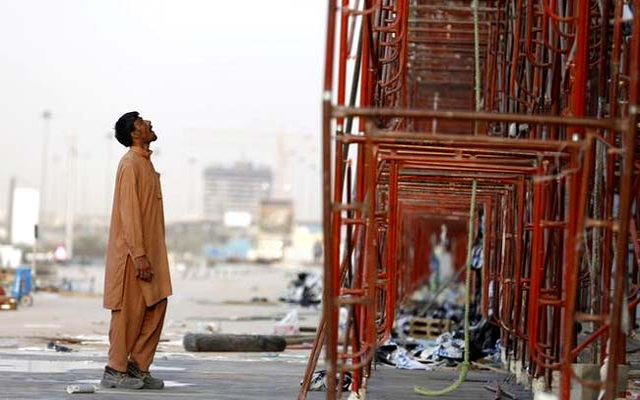The migrant crisis in Saudi Arabia continues as thousands of foreign workers, mostly from India, Pakistan, and the Philippines, remain stranded in the country without pay, passports, or food. Saudi Oger Ltd., a Lebanese-owned construction company, recently laid off over 30,000 employees without providing payment settlement or compensation to the many who had already gone months without pay. In addition to withholding wages, Saudi Oger stopped providing food, electricity, maintenance and medical services to several labor camps it operated. Saudi Oger’s institutional abandonment continues to affect thousands of migrant workers, and the Saudi government refuses to take responsibility for its role in this crisis.
Saudi Oger relies heavily upon the Saudi government for contracted work. The firm has built every type of project from defense installations to hospitals and schools. The Government of Saudi Arabia currently owes the company over 30 billion riyals, about $8 billion USD, for completed work. The backlog of payment has caused Saudi Oger to fail to meet its financial obligations, which include 15 billion riyals in loan payments, billions owed to contractors and suppliers, and 2.5 billion to its workers for back and severance pay. The Government of Saudi Arabia must immediately pay Saudi Oger for the services it received so that the company can pay its workers.
The migrant worker situation is so dire, and Saudi officials so unresponsive, that the governments of the affected workers have implemented their own assistance programs. Last month, Indian officials began passing out food rations and emergency provisions. The Pakistani embassy in Saudi Arabia recently opened a designated window to help the over 8,500 workers suffering from unemployment, and installed a hotline for those unable to reach the embassy. Pakistani officials have also begun renewing migrant workers’ passports for free in hopes expediting their return.
While many embassies are willing to provide new passports and return tickets for affected workers, they are still unable to repatriate their citizens due to Saudi law. Under the country’s kafala system, which is used to issue labor visas, workers must obtain an exit visa before leaving the country. This process can be incredibly time-consuming and elaborate. However, the Government of Saudi Arabia prevents the waiver or expedition of the process for the stranded workers.
While dozens of family members of the Pakistani workers protest in Islamabad, calling for the Saudi government to help their loved ones, Saudi Arabia ignores their calls and instead imposes new restrictions. Just this week, the Saudi Arabian External Affairs Ministry for Sri Lankan workers introduced new laws and regulations. Sri Lankan workers who abscond from abusive work environments will be forced to pay 400,000 riyals (approximately $2,750 USD) upon their departure from the country. For the Saudi government to endorse new legislation further restricting migrants rights in the midst of its abandonment of Saudi Oger workers is reprehensible.
The Government of Saudi Arabia must take responsibility for the lives of the thousands of stranded migrant workers within its borders. The government should uphold its financial obligations by completing its payment to Saudi Oger for the projects it completed, which in turn would help the company uphold its own contracts with its workers. Furthermore, Saudi Arabia must reform its kafala system and abolish its exploitive exit visa requirements. Saudi officials cannot continue to skirt the problems at hand, and must own up to their roles in this migrant crisis in order for it to be resolved.
Brittany Hamzy is an Advocacy Fellow at ADHRB.





